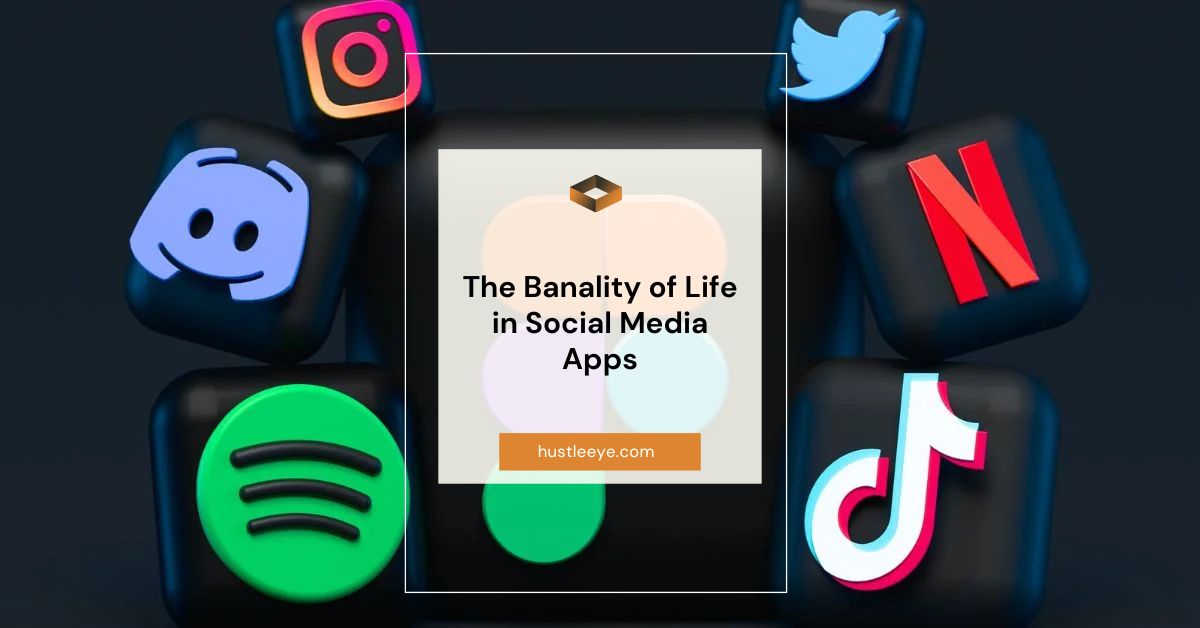In the digital age, social media has become an integral part of our daily lives. Platforms like Facebook, Instagram, Twitter, and TikTok have transformed how we communicate, share, and consume information.
However, amidst the glittering facade of filters, likes, and hashtags lies a profound question: has social media turned our lives into a mundane cycle of banality? In this article, we will explore the banality of life in social media apps, examining its impact on our personal experiences, social interactions, and overall well-being.
Table of Contents
The Allure of the Ordinary:
Social media was initially designed to connect people, foster creativity, and share significant moments. Yet, as these platforms have evolved, so too has the content that populates them. Today, we see a flood of ordinary, repetitive posts: meals, pets, daily routines, and selfies. While these posts provide a window into the everyday lives of users, they often lack depth and meaningful engagement.

The Rise of the Mundane:
The rise of mundane content can be attributed to several factors:
- Ease of Access: The ubiquity of smartphones and the simplicity of posting have made it effortless to share snippets of daily life.
- Validation through Likes: The dopamine rush from likes and comments encourages users to post more frequently, even if the content is trivial.
- Algorithmic Influence: Social media algorithms prioritize engagement, often promoting content that generates quick reactions rather than thoughtful interactions.
951-808-6091: How to Protect Yourself from Fraudulent Calls
The Impact on Personal Experiences:
The constant stream of banal content can have a profound impact on our personal experiences and perceptions of reality.
BNC Neo: Your Fee-Free Banking Solution
1. The Illusion of a Perfect Life:
Social media often presents an illusion of a perfect life, where everyone appears happy, successful, and constantly engaged in exciting activities. This illusion can lead to:
- Comparison and Insecurity: Users may feel inadequate or dissatisfied with their own lives when comparing themselves to the curated perfection displayed online.
- Superficial Interactions: Genuine connections and deep conversations are often overshadowed by the pursuit of likes and superficial engagement.
Can Humans Fly? Exploring the Revolutionary Innovations of WAPOLabs
2. The Pressure to Perform:
The pressure to maintain an active social media presence can also contribute to the banality of life. Users may feel compelled to document and share every aspect of their lives, leading to:
- Stress and Anxiety: The constant need to post can create stress and anxiety, as users strive to meet the expectations of their online audience.
- Reduced Enjoyment of Real-Life Moments: The focus on capturing and sharing moments can detract from the actual enjoyment of experiences.
D Rose CLU 600001 Art S85254 – Elevate Your Game and Style Today!
The Impact on Social Interactions:
Social media’s influence extends beyond individual experiences to our broader social interactions.

1. The Erosion of Authentic Communication:
The prevalence of mundane content can erode authentic communication:
- Shallow Conversations: Social media often encourages brief, surface-level interactions rather than meaningful conversations.
- Echo Chambers: Users may find themselves in echo chambers, where they are exposed only to like-minded individuals and ideas, limiting genuine discourse.
Discover 1200 W CR 104 Falfurrias TX 78335 : Detailed Guide
2. The Cult of Banality:
The cult of banality on social media can also shape societal norms and values:
- Normalization of the Trivial: The constant exposure to trivial content can normalize and even celebrate the mundane, shifting societal focus away from more substantive issues.
- Influence on Self-Identity: Users may adopt behaviors and attitudes that align with popular trends, even if they lack personal significance.
Geekzilla Autos: Revolutionizing the Automotive World
Finding Meaning in the Mundane:
Despite the banality that permeates social media, it is possible to find meaning and value in the ordinary.

1. Embracing Authenticity:
One way to counteract the banality of social media is by embracing authenticity:
- Sharing Meaningful Content: Users can choose to share content that reflects their true selves and experiences, fostering deeper connections.
- Engaging in Thoughtful Interactions: Prioritizing genuine conversations and interactions over superficial engagement can enhance the quality of social media use.
Unlocking the Potential of Web&Store: Your Ultimate Guide to E-Commerce Excellence
2. Curating a Purposeful Feed:
Curating a purposeful social media feed can also mitigate the impact of banal content:
- Following Inspiring Accounts: Users can follow accounts that inspire, educate, and uplift, creating a more enriching online environment.
- Limiting Exposure to Trivial Content: Reducing exposure to trivial content can help maintain focus on what truly matters.
Kase Abusharkh and Amy Berry: A Dynamic Duo Shaping the Future of Business and Technology
Conclusion:
The banality of life in social media apps is a complex phenomenon that reflects broader societal trends and individual behaviors. While social media has the potential to connect and inspire, it also risks reducing our lives to a series of mundane posts and superficial interactions.
By embracing authenticity, engaging in meaningful interactions, and curating a purposeful feed, users can navigate the banality of social media and find deeper value in their digital experiences.
FAQs:
1. How can I identify banal content on my social media feed?
Banal content on social media often includes repetitive, everyday activities that don’t provide new or valuable insights. This could be frequent updates on meals, daily routines, or selfies without context. It tends to focus on mundane aspects of life rather than unique or meaningful experiences.
2. Why do people feel compelled to share mundane details of their lives on social media?
People share mundane details for various reasons, including a desire for social validation, the need to feel connected with others, or simply because it has become a habitual part of their routine. Social media platforms encourage frequent posting, and many users feel a sense of reward from likes and comments, even on trivial posts.
3. Can the consumption of banal content on social media have long-term effects on our attention span?
Yes, consuming banal content regularly can impact our attention span. Constant exposure to trivial and repetitive content can train our brains to seek short, easily digestible pieces of information, making it harder to focus on more substantial and lengthy tasks or content.
4. Are there specific social media platforms that promote more banal content than others?
Platforms like Instagram, Snapchat, and Facebook often promote more banal content due to their emphasis on visual and daily updates. Features like stories, which disappear after 24 hours, encourage users to share frequent, often mundane, aspects of their lives. However, this can vary based on how individuals use the platforms and curate their feeds.
5. What are some strategies to reduce the consumption of banal content on social media?
To reduce the consumption of banal content, users can:
- Curate their feed by unfollowing or muting accounts that post trivial content.
- Follow accounts that provide meaningful, educational, or inspirational posts.
- Set specific times for social media use to avoid mindless scrolling.
- Engage with content thoughtfully by seeking out posts that offer depth and value.
- Use features like “Save” or “Bookmark” to collect valuable content for later reference.


